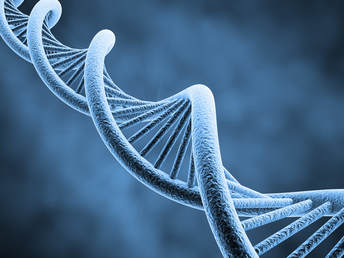MTHFR gene mutation

What is the MTHFR gene?
Humans have around 20,000 genes, one of which is the MTHFR gene which has two variants - C677T and A1298C. The gene provides instructions for making methylenetetrahydrofolate reductase; this enzyme is involved in different biochemical processes. Every time you consume vitamin B9 in food, the MTHFR enzyme is needed to convert vitamin B9 (folate) into methyl-folate (the usable form of the vitamin). Methyl-folate is very important because it is involved in a lot of different processes in the body, the most important is methylation.
Humans have around 20,000 genes, one of which is the MTHFR gene which has two variants - C677T and A1298C. The gene provides instructions for making methylenetetrahydrofolate reductase; this enzyme is involved in different biochemical processes. Every time you consume vitamin B9 in food, the MTHFR enzyme is needed to convert vitamin B9 (folate) into methyl-folate (the usable form of the vitamin). Methyl-folate is very important because it is involved in a lot of different processes in the body, the most important is methylation.
What is an MTHFR gene mutation?
An MTHFR gene mutation is a genetic problem in which the gene's position is mutated. There are different forms of MTHFR gene mutations involving the C677T and A1298C variants. These genetic mutations can be passed down to you from one or both of your parents. Having two mutated genes in either of the variants is known as homozygous, having one of the mutated genes in either of the variants is known as heterozygous, having one of each of the mutated genes in both variants is known as compound heterozygous. Here is a simple way to explain:
Below are the possible outcomes of an MTHFR gene test result:
MTHFR C677C = Normal MTHFR gene - 100% enzyme activity (normal methylation function)
MTHFR C677T = Heterozygous mutation (one mutation) - 66% enzyme activity
MTHFR T677T = Homozygous mutation (two mutations) - 25% enzyme activity
MTHFR A1298A = Normal MTHFR gene -100% enzyme activity (normal methylation function)
MTHFR A1298C = Heterozygous mutation (one mutation) - 83% enzyme activity
MTHFR C1298C = Homozygous mutation (two mutations) - 61% enzyme activity
MTHFR C677T + MTHFR A1298C = A compound heterozygous mutation - 48% enzyme activity
Please note: Having no mutation in one MTHFR gene variant will not cause the other mutated variant to have normal enzyme activity, it will not balance things out.
What impact do MTHFR gene mutations have on the body?
If someone has an MTHFR gene mutation, then it will affect a number of things within the methylation process, creating a ripple effect on a biochemical level. People with an MTHFR gene mutation cannot convert folic acid or folate into a useable form as well as they should. The mutation prevents the proper conversion of folate into a biologically active and useful form called L-methylfolate. L-methylfolate is needed for the manufacturing of important neurotransmitters such as serotonin and dopamine, having a deficiency can potentially cause and be associated with depression and other mental health problems.
Another issue with vitamin B9 and an MTHFR mutation is the inability to process folic acid which is the synthetic form of the vitamin. Due to folic acid not being converted into a useable form it can raise homocysteine; elevated homocysteine is associated with a number of health problems. People with the MTHFR gene mutation have an impaired methylation cycle causing mental and physical health issues; the methylation cycle is responsible for - cellular repair, detoxification, neurotransmitter production and healthy immune system function.
Improper methyl patterns cause detoxification problems, so the body is unable to eliminate and remove toxins and heavy metals properly. If an individual is attempting to remove copper and toxic/heavy metals then it can be more of a difficult process and an individual will be more sensitive to detox supplement use. Correcting the methyl pattern is needed for proper detoxification and the safe removal of harmful substances and common toxic/heavy metals.
Another issue with an impaired methyl cycle is the lack of necessary methyl groups to bind onto histamine and eradicate it, the result of this is raised histamine levels and histamine intolerance. This is why MTHFR gene mutations are associated with histadelia (high histamine). High histamine levels can affect brain chemistry and may be associated with a number of mental and physical health issues.
Below is a list of the key things that an MTHFR mutation can disrupt, cause and interfere with:
An MTHFR gene mutation is a genetic problem in which the gene's position is mutated. There are different forms of MTHFR gene mutations involving the C677T and A1298C variants. These genetic mutations can be passed down to you from one or both of your parents. Having two mutated genes in either of the variants is known as homozygous, having one of the mutated genes in either of the variants is known as heterozygous, having one of each of the mutated genes in both variants is known as compound heterozygous. Here is a simple way to explain:
- Homozygous = x2 mutations of the 677 variant or x2 mutations of the 1298 variant
- Heterozygous = x1 mutation of the 677 variant or the 1298 variant
- Compound heterozygous = x1 mutation of the 677 variant and x1 mutation of the 1298 variant
Below are the possible outcomes of an MTHFR gene test result:
MTHFR C677C = Normal MTHFR gene - 100% enzyme activity (normal methylation function)
MTHFR C677T = Heterozygous mutation (one mutation) - 66% enzyme activity
MTHFR T677T = Homozygous mutation (two mutations) - 25% enzyme activity
MTHFR A1298A = Normal MTHFR gene -100% enzyme activity (normal methylation function)
MTHFR A1298C = Heterozygous mutation (one mutation) - 83% enzyme activity
MTHFR C1298C = Homozygous mutation (two mutations) - 61% enzyme activity
MTHFR C677T + MTHFR A1298C = A compound heterozygous mutation - 48% enzyme activity
Please note: Having no mutation in one MTHFR gene variant will not cause the other mutated variant to have normal enzyme activity, it will not balance things out.
What impact do MTHFR gene mutations have on the body?
If someone has an MTHFR gene mutation, then it will affect a number of things within the methylation process, creating a ripple effect on a biochemical level. People with an MTHFR gene mutation cannot convert folic acid or folate into a useable form as well as they should. The mutation prevents the proper conversion of folate into a biologically active and useful form called L-methylfolate. L-methylfolate is needed for the manufacturing of important neurotransmitters such as serotonin and dopamine, having a deficiency can potentially cause and be associated with depression and other mental health problems.
Another issue with vitamin B9 and an MTHFR mutation is the inability to process folic acid which is the synthetic form of the vitamin. Due to folic acid not being converted into a useable form it can raise homocysteine; elevated homocysteine is associated with a number of health problems. People with the MTHFR gene mutation have an impaired methylation cycle causing mental and physical health issues; the methylation cycle is responsible for - cellular repair, detoxification, neurotransmitter production and healthy immune system function.
Improper methyl patterns cause detoxification problems, so the body is unable to eliminate and remove toxins and heavy metals properly. If an individual is attempting to remove copper and toxic/heavy metals then it can be more of a difficult process and an individual will be more sensitive to detox supplement use. Correcting the methyl pattern is needed for proper detoxification and the safe removal of harmful substances and common toxic/heavy metals.
Another issue with an impaired methyl cycle is the lack of necessary methyl groups to bind onto histamine and eradicate it, the result of this is raised histamine levels and histamine intolerance. This is why MTHFR gene mutations are associated with histadelia (high histamine). High histamine levels can affect brain chemistry and may be associated with a number of mental and physical health issues.
Below is a list of the key things that an MTHFR mutation can disrupt, cause and interfere with:
- Build-up of folic acid
- Brain inflammation
- Detoxification problems - unable to eliminate toxic/heavy metals and toxins
- Folic acid intolerance/reactions
- Glutathione (important antioxidant) deficiency
- Histamine intolerance
- Impaired methyl cycle/undermethylation
- Impaired neurotransmitter synthesis and production
- Impaired ability to convert vitamin B9 into a useable form
- L-methylfolate deficiency
- Methionine deficiency
- Neurotransmitter deficiency
- Oxidative stress
- Raised homocysteine levels
- Raised histamine levels
- Vitamin B6, B9 and B12 deficiencies
MTHFR gene mutation testing
Testing for MTHFR gene mutations can be done through a saliva sample (cheek swab), the saliva test can be done at home and then sent to the laboratory. For MTHFR gene mutation testing please click here for the available tests page.
Testing for MTHFR gene mutations can be done through a saliva sample (cheek swab), the saliva test can be done at home and then sent to the laboratory. For MTHFR gene mutation testing please click here for the available tests page.
MTHFR gene mutation treatment
Treatment for an MTHFR gene mutation involves dietary changes, lifestyle changes, supplement use to correct the impaired methylation cycle and limiting and eliminating exposure to environmental toxins like toxic metals. If you undergo testing for the MTHFR gene then you will receive the treatment programme attached in the results email. If you have any questions about your results, then mindovermetal will answer them for you.

